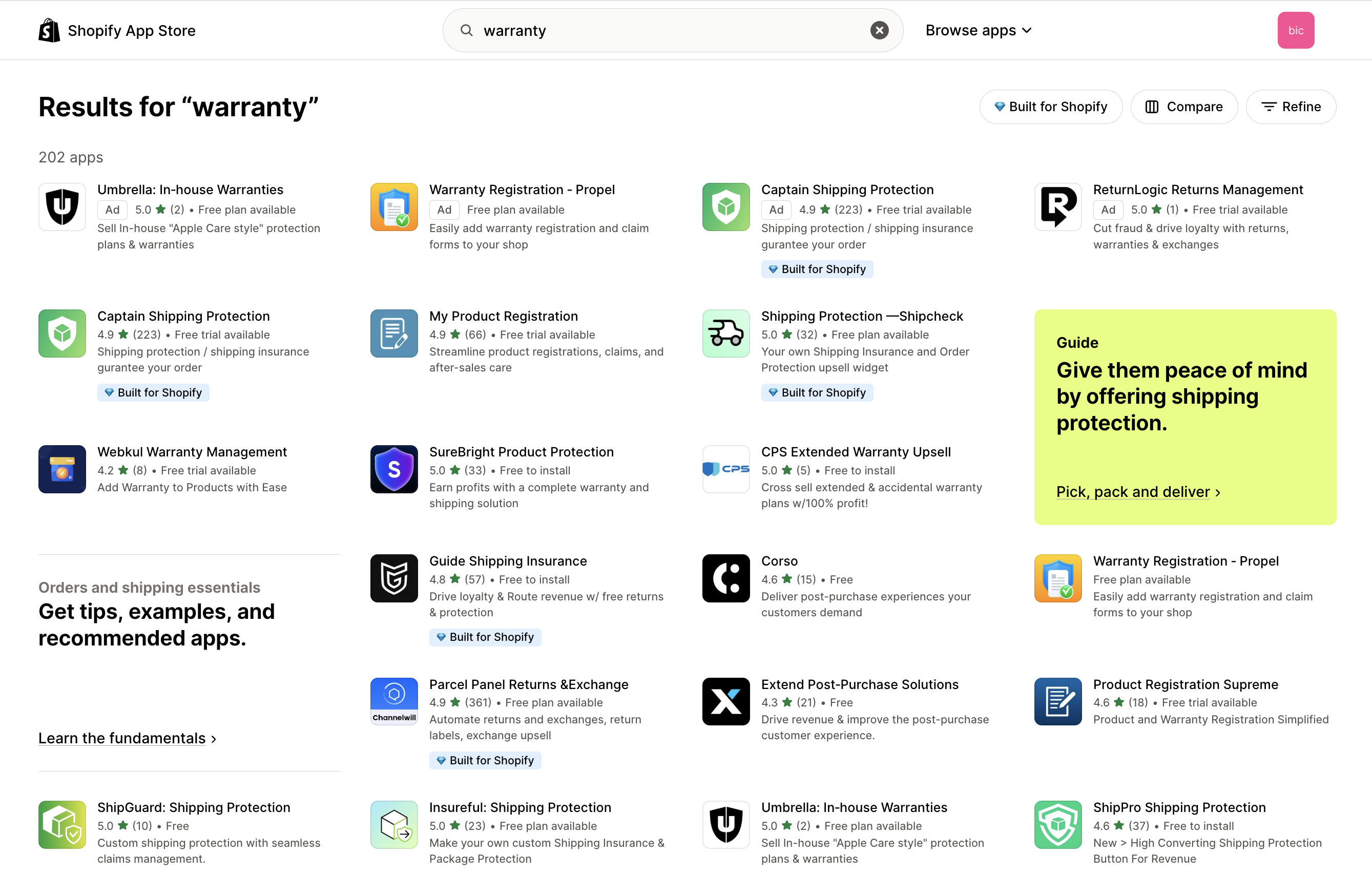The Best Warranty Apps for Shopify in 2025: A Complete Comparison

Introduction
As product protection becomes a critical revenue and retention tool in eCommerce, Shopify merchants are looking beyond simple returns and refunds. They want tools that let them upsell extended warranties at checkout, automate OEM registrations post-purchase, and manage claims without handing over profits or brand control.
But the market for Shopify-compatible warranty tools is fragmented. Some platforms offer white-labeled, self-managed tools. Others act as insurance providers that handle claims but take a large cut of the sale. Some focus on upsells, while others cater only to post-purchase support.
This guide breaks down the 7 most talked-about solutions in 2025—Umbrella, Extend, Mulberry, Dyrect, Webkul, Corso, and CPS—with real comparisons across upsells, OEM automation, profit structure, features, and customer experience.
Feature Comparison Summary
✅ = fully supported
⚠️ = partially supported or limited
❌ = not supported
In-Depth Platform Breakdown
1. Umbrella
Overview:
Umbrella is a self-managed, white-labeled warranty platform built specifically for Shopify. It enables merchants to offer both extended warranty upsells at checkout and automated OEM warranty registration, while keeping full control of branding, pricing, and fulfillment.
Use Case Examples:
- An electronics brand offers a 1-year included OEM warranty + customer buys an optional 2-year extended plan for 15% of the product price
- An fishing geat merchant offers accident protection upsells at checkout, resolved via store credit.
Strengths:
- 100% of warranty revenue stays with the merchant
- Customizable coverage rules per product or SKU (e.g. defects only vs damage/loss)
- Branded, customer-facing claims portal
- Built-in support for OEM warranty registration workflows
- Multiple resolution methods: replacement, repair reimbursement, store credit, discount codes
- Terms & conditions generator for legal compliance
- Fully white-labeled emails, notifications, and claim flows
- No commissions, flat monthly fee
Limitations:
- Merchants are responsible for resolving claims (automated tools make this easy)
- Does not provide insurance, merchants are responsible for resolutions.
2. Extend
Overview:
Extend is an insurance-backed third-party warranty provider. It integrates with Shopify and allows merchants to offer extended warranty upsells at checkout, but claims are handled entirely by Extend’s team and revenue is shared.
Use Case Example:
- A consumer electronics store adds a 2-year accidental damage protection upsell at checkout, fulfilled by Extend's network
Strengths:
- Hands-off for merchants
- Recognized provider with experience in regulated warranty environments
- Coverage includes accidental damage and higher-risk items
- APIs and native integrations available
Limitations:
- Extend keeps most of the warranty revenue
- Little control over pricing, coverage rules, or customer communication
- No OEM registration functionality
- Claims are managed externally, outside the merchant’s brand
3. Mulberry
Overview:
Mulberry offers third-party extended warranty plans across multiple verticals. Claims are managed off-platform by Mulberry and branded co-experience flows are often required.
Use Case Example:
- A home goods brand adds pre-set Mulberry protection plans to products like furniture and small appliances
Strengths:
- Quick to install
- Works with many common product types
- Covers electronics, furniture, and home accessories
Limitations:
- Revenue share leaves merchants with a small percentage of plan sales
- No OEM registration functionality
- No support for dynamic pricing or custom coverage rules
- Branding is provider-led, no white label option possilble
4. Dyrect
Overview:
Dyrect is a newer entrant offering basic post-purchase product protection tools. It supports extended warranty upsells but lacks deeper functionality around OEM programs or claim customization.
Use Case Example:
- A wellness brand uses Dyrect to offer a flat 1-year extended plan post-purchase, managed via Dyrect’s support team
Strengths:
- Offers a simple upsell flow
- Basic coverage rules per product type
- Connects to Shopify without heavy development
Limitations:
- Revenue is partially shared
- Claim process not customizable
- No OEM registration workflows
- Limited resolution logic
5. Webkul Warranty Management App
Overview:
Webkul offers a simple manual tool for tracking warranties, mostly suited for smaller merchants. It allows product registration and warranty duration tracking but lacks true claim management or automation.
Use Case Example:
- A parts seller manually tracks warranty windows for eligible SKUs, with no upsell or automated claims
Strengths:
- Self-managed, low cost
- Basic support for warranty period tracking
- Works with return workflows
Limitations:
- No checkout upsell capability
- No OEM registration
- No automated claims, no dynamic pricing
- No integrations with shipping or repair tools
6. Corso
Overview:
Corso originally focused on shipping protection but has expanded into return protection and limited post-purchase coverage. It is not a full warranty platform.
Use Case Example:
- A lifestyle brand uses Corso to offer “green returns” or store credit instead of refunds for damaged items
Strengths:
- Easy to implement for return deflection
- May appeal to sustainability-focused brands
- Simple messaging at checkout
Limitations:
- Not a true warranty tool
- No OEM registration
- No configurable plans, pricing, or claim rules
- Brand control and logic very limited
7. CPS (Consumer Priority Service)
Overview:
CPS is a legacy extended warranty provider that enables Shopify merchants to offer insurance-backed protection. Claims are handled off-platform and warranty SKUs must be manually created and managed.
Use Case Example:
- A small electronics store lists 1- and 3-year CPS protection plans as separate SKUs
Strengths:
- Backed by a licensed insurance administrator
- Covers electronics, appliances, and gadgets
- Prebuilt plan durations and categories
Limitations:
- Manual SKU setup for warranty products
- No claim customization or branding
- No OEM functionality
- Merchant receives limited revenue
- Dated UI and experience
Final Verdict
If you want to offer both OEM warranty registration and extended warranty upsells under your own brand, AND keep the revenue, Umbrella is the only platform built to give you full control without relying on third parties.
Other platforms may be suitable if you're looking to offload responsibility entirely, but most come with tradeoffs: low margins, limited customization, external branding, or manual processes.


